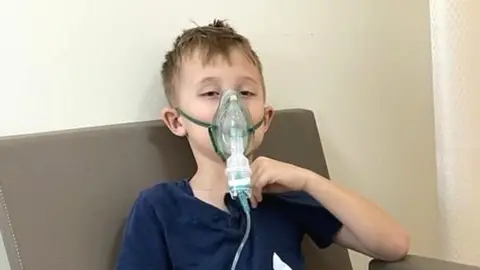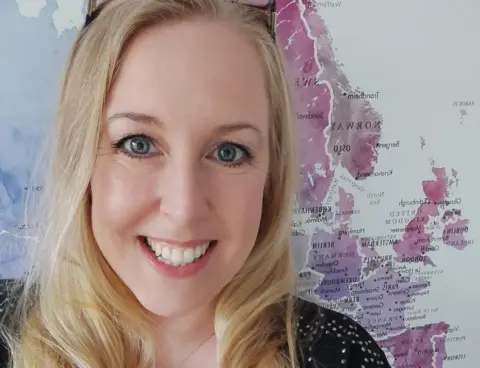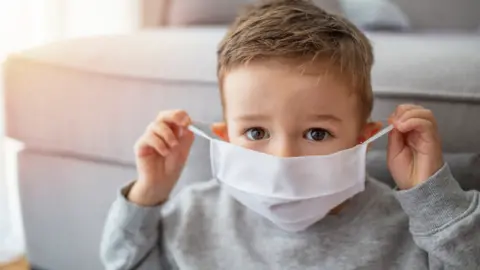Children with long Covid in Scotland 'dismissed and ignored'
 Jennifer Robertson
Jennifer RobertsonChildren with long Covid have been "dismissed and ignored" by those supposed to support them, the Scottish Covid Inquiry has heard.
Long Covid Kids said the Scottish government and public health bodies had not done enough to help families and children had suffered as a result.
Helen Goss said the charity represents more than 250 families in Scotland, with the number growing all the time.
The Scottish government has recognised the impact long Covid has on wellbeing.
It has made £3m from its £10m Long Covid Support Fund available over this financial year.
The money is to be used to support NHS boards to increase the capacity of existing services supporting those with the condition.
Ms Goss, whose daughter is bedbound after Covid, said an estimated 10,000 children had long Covid. She said that was based on figures from the Office for National Statistics.
However, a failure to gather data meant "we have no idea" exactly how many children were affected but she believed paediatric long Covid was under-reported within the NHS.
Getting these chronically ill children the treatment and support they needed was "an absolute battle every single day" for parents, she said.
"There needs to be a lot more attention on long Covid," she added.
BBC Scotland previously told how Helen's daughter had not recovered since catching Covid in 2020.
Three years on, her daughter is still bedbound and unable to attend school.
The child was "unbelievably unwell" after having a mild case of Covid in March 2020 and has remained ill ever since.
'Power struggle'
Ms Goss said healthcare professionals were often not appropriately trained to diagnose and treat patients with long Covid.
She said there were inconsistencies across health boards, leading to a postcode lottery of care.
She said there had been no education given to health care professionals.
When families go to their GPs, they are not up to date on the latest research. She said GPs did not have the time to be hunting down the latest research on the chronic illness, whereas "we have become patient experts in our own condition", she said.
This could lead to a "power struggle" when asking doctors to try new treatments. She said sometimes doctors were unwilling to listen or act on patients' research.
"There is definitely a suspicion... I would say an unwillingness to accept that we know what we are talking about," she added.
Inappropriate treatments were also being recommended, she said, including exercise and cognitive behavioural therapy.
Many families were having to resort to private healthcare in desperation to help their children, she noted.
 Helen Goss
Helen Goss Another parent told BBC Scotland News about how her son had struggled to recover.
Jennifer Robertson said Fergus had temperatures for 78 days straight the first time he had Covid, as well as other symptoms including chest pain.
He has now had three Covid infections, and - despite some of his post-viral symptoms improving - is still suffering with "worrisome" vocal and motor ticks 24/7.
Ms Robertson has been told these are due to inflammation on his brain.
This made her concerned about what other damage the virus had done to Fergus's body that cannot be seen.
Ms Robertson says she was finding "zero support from the NHS" for her 11-year-old.
"I don't feel Scotland is doing much of anything at all to help those with long Covid, either children or adults" she said.
They have been travelling to a private doctor in London for treatment.
Ms Robertson added: "We would like to see more studies geared towards the paediatric side.
"I would love to see a clinic dedicated to children with long Covid in Scotland. It can't happen soon enough.
"We would love to have training for the NHS so local GPs could identify conditions which might be linked to long Covid."
Symptoms 'dismissed'
Speaking to BBC Radio's Good Morning Scotland, Heather described what her 16-year-old daughter has gone through living with long Covid.
Her daughter got Covid in August 2021, three weeks after returning to school - and two weeks before she was due to be vaccinated.
She says pupils should have been vaccinated before they returned to classrooms.
Her daughter's symptoms have at times been "dismissed" by hospital staff.
There was too much focus on symptom management rather than treatment in her experience.
When asked about the ongoing Covid inquiry, Heather was doubtful it would change anything.
A Scottish government spokesperson said: "We are co-operating fully with the UK Covid-19 Inquiry and the Scottish Covid Inquiry and will follow all of the evidence given closely.
"We support both Inquiries in their work to explore the handling of the pandemic and to identify the vital lessons we all need to learn.
"It would not be appropriate to comment on detailed evidence presented to either Inquiry at this stage."
What is Long Covid?
 Getty Images
Getty ImagesLong Covid isn't fully understood, and there's no internationally-agreed definition - so estimates of how common it is, or what the main symptoms are, vary.
Guidance for UK health professionals refers to symptoms that continue for more than 12 weeks which cannot be explained by another cause.
According to the NHS, these can include:
- extreme tiredness
- shortness of breath, chest pain or tightness
- problems with memory and concentration ("brain fog")
- changes to taste and smell
- joint pain
But patient surveys suggest a range of other symptoms may also be present, including gut problems, insomnia and vision changes.
The severity of problems also varies enormously.
